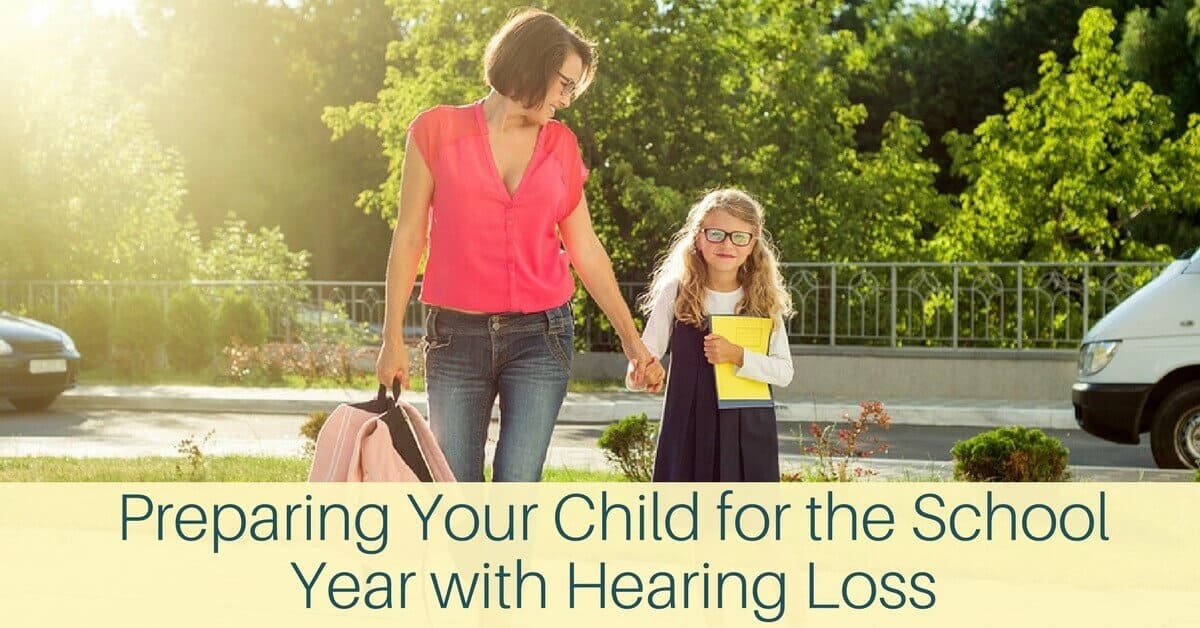Hearing is vital to learning, and children with hearing loss often fall behind their hearing peers due to a lack of access to information in the classroom. Parents and educators must work together to make sure hard of hearing students are able to hear and understand as much as possible, with the help of assistive hearing technologies, adapted classroom instruction, and other strategies. If you have a school-aged child with hearing loss, here are some tips to help get them ready for the year ahead.
A back to school with hearing loss to-do list:
- Make an appointment for a hearing exam. The ability to hear–as well as possible–is vital for school-aged kids. They need to be able to understand their teachers, talk to their classmates, and hear cars when crossing streets. Make sure your child’s hearing devices are in good working order and still meeting their hearing needs before the start of the year, so they can have fun, learn, and stay safe throughout the day.
- Work with school staff to make an Individualized Education Plan (IEP) for your child.
If your child has a hearing loss and is starting school, you’ll want to work with their teacher and school staff to make an Individualized Education Plan for them. The school administration has the responsibility to ensure access to school communication that is as effective as it is for their typically hearing peers, and making an IEP will make sure they are receiving the help they need to communicate and succeed in the classroom. Depending on their level of hearing loss, you may want them to have speech-language therapy at some point in the day, or if their loss is mild you can include other accommodations, such as being seated near the teacher, or having important instructions written down. If your child already has an IEP in place, you’ll want to review it and see if any adjustments are necessary for the coming year. - Talk to your child about how to ask for help. Although as a parent you naturally want to do as much as possible to help your hard of hearing child succeed in the classroom, the fact is you can’t always be there. One of the best things you can do is talk to your child about how to ask for help and be their own advocate. Go over the basic points of their IEP with them, and make sure they are not afraid to speak up if they don’t understand something, or if something’s not right.
- Show your child (and their teacher) the basic functions of the hearing aid. Before the first day of school, take some time to familiarize your little one with their hearing device. Help them with the basic functions, including how to switch programs, adjust the volume, and change the batteries (if they are old enough to do so). Your child’s teacher should also be familiar with the operations of your child’s hearing aid, and should know how to make sure the batteries are working.
- Pack back-up batteries for hearing aids! Be prepared. If you have a child who relies on hearing aids to hear in the classroom, the last thing you want is for their hearing aids to suddenly go dead, with no back up. On the first day of school, give them an extra pair of hearing aid batteries to give to their teacher, and another pair to give to the nurse, should the need arise.
- Bus safety. If you have a hard of hearing child that takes the bus, inform the bus company and driver about their hearing loss. You can ask that they be seated closer to the front, or that they sit with someone they know who can act as a “safety buddy” should there be an emergency.
Pediatric hearing loss–how adults can help
Parents, teachers and caregivers are the most important force in making sure hearing loss is detected and treated early, so that it doesn’t stand in the way of a child’s education. Adults can also be a positive influence by talking to teens about how to avoid noise-related hearing damage. If your child or teen is listening to music at unsafe levels, help them to see the importance of safe listening habits. With the rates of hearing loss increasing in young people, good hearing health is not something we can afford to take for granted any longer.
If your child is slow to speak and seems to have difficulty hearing and learning, take them in for a hearing exam right away. Hearing loss is very treatable, and hearing aids can make all the difference, both in the classroom and out of it.
At Desert Valley Audiology, we provide comprehensive hearing health care for children and teens. To schedule a hearing test for your child, contact us today.

